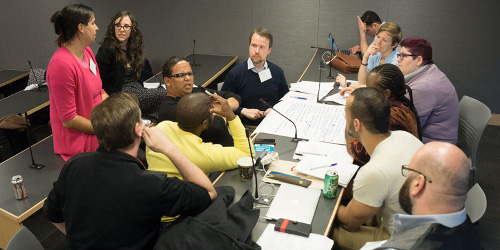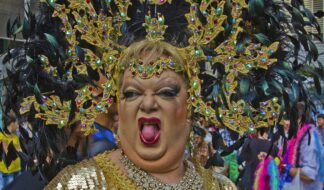BY BTL STAFF

NEW YORK – How can people measure the degree to which lesbian, gay, bisexual, transgender and intersex people are included – and, as likely, excluded – from the lifeblood of societies around the world?
This is the overriding question that brought 75 data experts, LGBTI activists, scholars, NGO leaders, researchers and others together last month in New York for the first time to grapple with the information and data that will be needed to create the first Global LGBTI Inclusion Index. The group will make recommendations to the United Nations Development Programme (UNDP), which will create the index.
The group that met at the CUNY School of Law was invited by OutRight and the International Lesbian, Gay, Bisexual, Transgender and Intersex Association (ILGA), the two NGOs that UNDP is consulting with directly to create the new index.
OutRight's regional experts on Africa, Asia, Latin America and the Caribbean, and the Middle East and North Africa participated in the meeting, along with senior staff, including Executive Director Jessica Stern, and OutRight board co-chair Amie Bishop, an independent global health consultant. Those involved in the discussion have worked on some aspect of LGBTI advocacy, community activism or research on LGBTI people and many are important figures in this world.
The group's three days of discussion on Dec. 14-16, 2015 will provide input to the UNDP on how an index can measure the experiences of stigma, discrimination, violence and economic exclusion that mark the lives of millions of LGBTI people every day.
The conversations focused on the range of needs, experiences and services that affect the well-being of LGBTI people: education, economic well-being, legal rights, gender recognition and health care.
The fact that there is no existing index of this kind underscores the UN's challenge in ensuring that LGBTI people across the world can contribute to and benefit from sustainable development.
The premise of the index is simple: when people are counted, no one is left behind.
The UN's recently adopted Sustainable Development Goals (SDGs) are a powerful commitment to reduce poverty, achieve equality and promote peaceful and inclusive societies. But as noted by Clifton Cortez, UNDP's global lead on LGBTI issues: "As long as lesbian, gay, bisexual, transgender and intersex people are ostracized by their families, bullied in schools, unable to obtain jobs they qualify for or access quality health care, or feel unsafe in their own communities, achieving the Sustainable Development Goals will not be possible."
While discrimination and inequalities based on sexual orientation and gender identity or intersex status exist across the world, there has never been an attempt until now to measure their broad existence through data collected by governments, civil society and development partners. The SDGs focus intently on marginalized and vulnerable groups. If this global effort is to succeed for all people, it must include LGBTIQ people's experiences.
To collect the data that the index will require, participants at the meeting probed questions that ranged deep and wide across a range of concerns:
– Do schools have anti-bullying policies?
– Are teachers trained in human development of sexual orientation and gender identity?
– If same-sex activity is a criminal offense, what efforts are being made to decriminalize?
– Do laws exist to prevent discrimination in employment based on sexual orientation and gender identity?
– What is the frequency of hate speech in the media, on the Internet, by religious and community leaders?
– Can LGBTI people access higher education?
– What are the rates of violence – partner violence, family and domestic violence, gang violence and other forms of violence that target LGBTI people?
For civil society, especially organizations that advocate to protect human rights as they are impacted by sexual orientation and gender identity, the new index offers the promise of making the rights of LGBTI people visible in places where they are ignored – and deliberately so.
"This can work to pressure countries who are excluding LGBTIQ people," said OutRight's Maria Sjodin. "In some places, it can be a first step, a way to make our community visible and to get countries to pay attention to people who are being left out of development aid and support."










